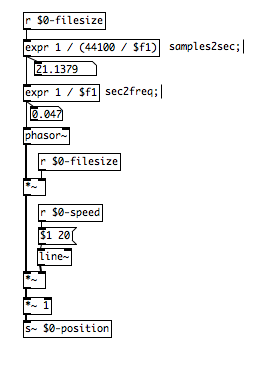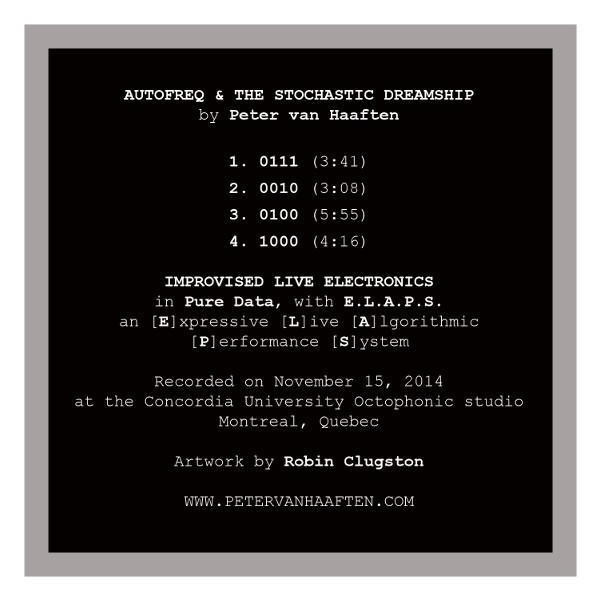-
petervh
posted in technical issues • read morecool, thanks mod!
might you have a simple technique to make speed modulation sound less choppy?

[edit]
updated patch. . . .
pd_grains2.zip -
petervh
posted in technical issues • read moreHi,
I am trying to build a granular audio-file processor which allows independent control of speed & pitch, and which allows alteration to both parameters throughout continuous audio file playback.
I have copied over a patch described in Farnell's Designing Sound which offers most of what I am after. However in Farnell's patch, every time an adjustment to speed is made, it also needs to restart audiofile playback for the new parameter to function (see [r $0-speed]).
My patch is attached. Does anyone have any ideas on how I can modulate the speed parameter without restarting audiofile playback?
Instructions:
- load "grain_host.pd"
- click "load_wav"
- select audio file "voice1.wav"
- click "play"
- modulate parameters.
Thanks !!
Peter
-
petervh
posted in technical issues • read moreGreetings,
I am slowly picking up Csound. At the moment, I am mostly looking to use Csound instruments controlled by processes set up in Pd, using [Csound6~].
I have had success sending noteon & noteoff messages from Pd with a few instruments described in the FLOSS manual, and in Boulanger's Csound book. However, some instruments have been giving me trouble, and while I can load them in and hear a little example score playback, in some cases I cannot figure out how to control noteon & noteoff through Pd.
One such instrument is attached to this post. This is adapted from Dr. Russell Pinkston's phase modulation instrument, number 1203 from Boulanger's Csound book.
I have included three versions, the first .CSD file uses 'mididefault' and 'midinoteoncps' to allow MIDI control of noteon/noteoff, while the second version uses cpsmidi and ampmidi. The third version is nearly identical, but does not include any of the MIDI input information, and includes a default score section which performs a few notes.
Neither of my first two .CSD instruments are currently outputting sound when triggered via MIDI (using 1203.pd).
I have investigated the following two documents, which have not really been of help for this particular instrument:
http://www.csounds.com/manual/html/MidiInterop.html
http://www.csounds.com/manual/html/CommandFlagsCategory.html#FlagsCatMinusUpperM
I wonder if anyone here is experienced in integrating Csound instruments into Pd, and if I could benefit from their observations of adapting Csound instruments for real-time control via [Csound6~].
Many thanks!
-
petervh
posted in news • read moreA free e.p. of improvised live electronics, in Pure Data with E.L.A.P.S. (an expressive live algorithmic performance system). Featuring algorithmic processes and a unique set of tangible control interfaces.
In the months to come, individual E.L.A.P.S. instruments will be open-sourced under the GPL license, and made publicly available through my artist website.
Autofreq & the Stochastic Dreamship:
http://www.petervanhaaften.com/autofreq.shtml
and full E.L.A.P.S. documentation:
http://www.petervanhaaften.com/elaps.shtml
Thanks!
Peter


-
petervh
posted in technical issues • read moreoh! i just found [wavinfo]. seems to deliver the goods.
-
petervh
posted in technical issues • read morePd-extended, for whatever reason, is not really usable and crashes every time I connect an MPD32. That's why I need Pd vanilla.
Hey, my MPD24 does that too! Really weird, none of my other controllers have caused this behavior. I get around it with MIDI cables, and a USB power adapter, but its kind of a hassle.
-
petervh
posted in technical issues • read moreGreetings,
I am working on a live recording/looping patch, and I need to find the length of a WAV file, in samples. I am not using [soundfiler], due to inherent dropouts caused when switching WAV files..
I've tried [soundfile_info]...but it outputs a slightly incorrect calculation!!
I've also tried out [shell] with SOX, but SOX outputs its results to STDERR, rather than STDOUT. I've also tried adding '2>&1' to the SOX command, in order to reroute STDERR to STDOUT.
This works fine in my terminal, but when sent from PD I get this message:
"sox FAIL stat: Summary effect: unknown option"
So I am at a bit of a loss. Any recommendations? I am running OSX10.8.
Thanks!!
PVH
-
petervh
posted in output~ • read moreDocumentation and recorded audio, available at
petervanhaaften.com/livingcircuits.shtmlLiving Circuits 1
An entirely autonomous performing/composing instrument, using 12 tone serialism.
Written in Pure Data, an internal variable score defines a semi-fixed structure. A 12 tone pitch matrix is automatically built, and the various transformations, inversions, and retrogrades are triggered to playback via a Euclidean rhythm generator.
Audio output is routed back into the system for automated processing and spatialization via scored event triggers, and weighted random number generators.
Every performance is unique.
-
petervh
posted in technical issues • read moreGreetings,
Does anybody here know of a way to get Puredata to send messages to the command line terminal? I'm using PD to record large chunks of audio, and I want to be able to stretch & pitch shift those recorded wavs after they have finished recording.
Both the rubberband and akaizer libraries offer command line control, and seem like good solutions. Is there an easy way to do this? I am running OSX 10.8.
Many thanks,
p.
-
petervh
posted in technical issues • read moreGreetings,
I'm having trouble with a patch I've built, which is just sending too much information at once.
I've created an abstraction to handle converting midi messages into OSC messages. In my patch, I have 16 instances of this abstraction. I need to make sure that OSC messages are sent out by only one instance of this abstraction at a time.
That is, i need to delay the output of the other instances of the abstraction until the instance previous to it has completed.
Could anybody offer me some advice on how to most readily achieve this?
Many thanks!
- Peter
-
petervh
posted in technical issues • read moreGreetings,
I'm working on a live beat slicer, similar to MLR for the Monome (but in this case, for the Yamaha Tenori-on).
Instead of simply dividing my sample layers by 16, I am trying to do transient analysis of the sample, to determine the 16 best possible positions to start my sample from.
To do this, I am using a variation of saturno's [findhits~] patch, available in this thread:
http://puredata.hurleur.com/viewtopic.php?pid=14201#p14201
Now, this patch works great for defining all possible transient slice points in a given sample. And using a [thresh( message allows me to define a given threshold, with which I can bring down the range of possible slice points considerably.
However, I need to bring the number of possible transient slice points down to only 16, every time. Can anyone offer me some advice on this best way to approach this?
Many thanks!
- Peter
-
petervh
posted in technical issues • read moreGreetings group,
I'm a little new to PD, and am trying to build a basic sampler for a larger project. It mostly works fine, however when I play a sample in reverse, on the first play it will play the sample twice.
I'm pretty sure that it is a very simple problem I am just overlooking. I am including the patch & 'samplelow2.wav'. The sampler operates by being sent a message containing two bits of information-- controlling amplitude & playback speed.
Thanks to whomever takes a look.

p.
-
petervh
posted in technical issues • read moreGreetings group,
I'm a little new to PD, and am trying to build a basic sampler for a larger project. It mostly works fine, however when I play a sample in reverse, on the first play it will play the sample twice.
I'm pretty sure that it is a very simple problem I am just overlooking. I am including the patch & 'samplelow2.wav'. The sampler operates by being sent a message containing two bits of information-- controlling amplitude & playback speed.
Thanks to whomever takes a look.

p.
-
petervh
posted in technical issues • read moreIs anybody aware of a working wave terrain synthesis patch in pure data?
Thanks.
-
petervh
posted in technical issues • read moreGreetings,
I'm a little new with PD, so I could use some pointers on a simple patch I am writing. The patch is to be used to convert midi messages coming out of a 'Rockband Pro' guitar. This toy guitar has buttons for every fret, and strings to trigger note on for each of those buttons.
I am posting my current patch here, which translates the first five notes on the low E string. Note data is received from the guitar on 6 different channels (channel 6 is low E).
The patch checks to see the note number, and then to see if velocity is higher than 0 (note on). If a message comes in from channel 6, note 16, above velocity 0, then it sends a note message for E1. Detecting channel is important, of course, because the same note can appear more than once across the fretboard.
Right now, when using this patch, I am finding some significant latency compared to just using midi out from the guitar directly. Any help would be greatly appreciated!
p.
-
petervh
posted in technical issues • read moreGreetings,
Let me preface this question by first stating that I am almost totally new to puredata.
I am curious if it is possible to remap a sysex string to a midi note in puredata. I am wondering first if it is even possible (on windows), and second how perhaps I may go about doing so.
I am looking to convert this message:
F0 43 73 01 33 01 00 06 00 00 00 00 00 F7
....into midi note 00 or C-1.
I am looking to convert messages sent by my Yamaha Tenori-on (256 button grid) into midi notes to be sent across midi yoke into a program called Renoise, and used by scripts within Renoise.
I am also looking to have midi notes sent back out of Renoise across midi Yoke through puredata, converted back into sysex and sent to the midi in of the Tenori-On (bi-directional feedback).
Inevitably, I would need to write a patch that can convert all 256 on/off button commands into midi notes, and back from midi notes into sysex. But converting first just one message would be a good start!
For reference, the sysex code sent out of the tenori-on when turning on the LED under the top left button of the Tenori-on is...
F0 43 73 01 33 01 00 06 00 00 00 00 00 F7
The next button to the right is...
F0 43 73 01 33 01 00 06 01 00 00 00 00 F7
The button on the far left on row two is...
F0 43 73 01 33 01 00 06 00 01 00 00 00 F7
The next button to the right is...
F0 43 73 01 33 01 00 06 01 01 00 00 00 F7
...and it continues left to right and downwards in this fashion.
More can be found on my quest to re-map the Tenori-on into an actually useful midicontroller on the Renoise forum: http://www.renoise.com/board/index.php? … i-mapping/
Thanks!
p.
-
-
-
petervh
posted in technical issues • read moreFurther, I have each instance of ctleuclid outputting to a different send ($0-oscreceive1 - $0-oscreceive16).
So I need to create some kind of test to see if a message has passed through, and if so, it needs to turn off the output of all other $0-oscrecieve's, and set them to just record the output, and bang it out after the previous instance has completed it's process.
Basically 'm having trouble in two places:
-
Determining if a message is coming out.
-
Recording all 17 messages each time a button is pressed, and sending them back out properly.
-
